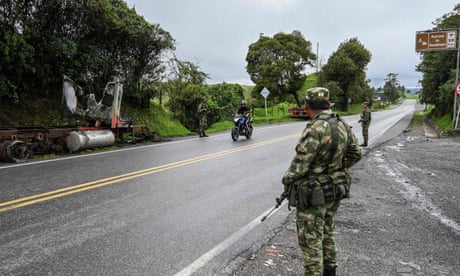- by foxnews
- 23 May 2025
‘It’s total terror’: Colombian cartel retaliates over kingpin’s arrest
‘It’s total terror’: Colombian cartel retaliates over kingpin’s arrest
- by theguardian
- 09 May 2022
- in news

Paramilitary militiamen in balaclavas and military fatigues had thrown up a string of roadblocks and declared an "armed strike", torching vehicles, forcing businesses to close, and stopping all traffic.
"There's absolutely no one around, because any vehicle they find on the roads they set on fire," said Jorge, using a false name to avoid any reprisals. "It's total terror."
Otoniel faces a litany of drug-trafficking charges in the US, as well as over 120 charges in Colombia - including allegations of murder, illegal recruitment, kidnapping for ransom, sexual abuse of minors, terrorism, illegal possession of weapons and drug trafficking.
But even as prosecutors in New York boasted that the alleged kingpin would finally face justice, Colombians across a swath of the country remained hostage to the terror unleashed by his thousands of henchmen.
Militiamen have blocked main roads and forbidden everyone to venture out, even to buy food.
"We don't know how long this will go on. The water and power keeps going out, there's no transport, and food is running low. We just have to wait and see what happens."
Videos shared by residents with the Guardian show streets that normally teem with commerce were now completely deserted.
"Entire municipalities are shut down, buses have been burned, and nobody can leave their homes."
A threatening flyer in the name of the Gaitanist Self-Defense Forces of Colombia (AGC) - the name the cartel uses for itself - have been distributed in several towns, stating that the armed strike will last for four days, and that the cartel will not be held responsible for the "consequences that could be unfavourable". Shops, schools and government buildings were graffitied with the AGC's insignia.
"We are the prisoners, not Otoniel," said another resident of a village in the region. "Everyone is confined to their homes, and nothing - not even an ambulance - moves. This is a silent chaos."
Otoniel's capture was hailed by US and Colombian authorities as a major blow against narcotraffickers, but police say that two of his lieutenants, known as Gonzalito and Chiquito Malo, have taken command of the militia, which is believed to have as many as 2,000 fighters, and in addition to drug trafficking is also involved in people trafficking, extortion, kidnapping for ransom, and forced recruitment of children.
Colombian authorities have responded to the violence by launching an "anti-terrorism policy", principally aimed at lifting roadblocks. "The instruction to commanders is to deploy all their capabilities, and especially to be on the offensive against these criminals," said a police spokesperson on Friday morning.
Analysts say the terror in northern Colombia is a predictable consequence of the country's hardline tactics in the "war on drugs", which often overlook civilian populations living among traffickers.
"This is a perfect demonstration of what the problem is with Colombia's approach to groups like the Clan del Golfo, in the sense that decapitating them with these large-scale, high-profile arrests like that of Otoniel have done nothing to affect the structure of the organisation," said Elizabeth Dickinson, a Colombia analyst with the International Crisis Group, a thinktank.
"The daily reality in regions they control or contest continues to involve high levels of social control, a forced recruitment, coercion, extortion."
"All of that is invisible, but in a moment like this, it becomes impossible for the state to ignore the depth of presence of a group like the Clan del Golfo in this region," Dickinson said. "It's actually quite shocking."
- by travelandtourworld
- descember 09, 2016
Jamaica achieves record twenty-five percent growth in Caribbean visitor arrivals, led by Cayman Islands, Trinidad and Tobago, and Bahamas: New Updates You Need to Know
Jamaica has seen a remarkable rise in tourism from its Caribbean neighbors, with visitor arrivals climbing by twenty-five point one percent in 2024. This substantial increase highlights the island’s growing reputation as a top destination within the Caribbean and demonstrates the success of focused initiatives to grow regional travel.
read more


